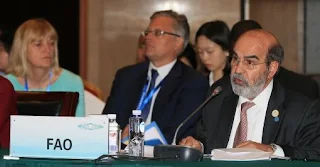The President of the Alliance for a Green Revolution in Africa (AGRA) and former Rwandan Minister of Agriculture and Animal Resources, Dr. Agnes Kalibata, would be joined by the Director of Nutrition at the Bill & Melinda Gates Foundation, Shawn Baker, and Haris Gazdar, Senior Researcher at the Collective for Social Science Research as well as the Principal Investigator for the IMMANA, Dr. Suneetha Kadiyala, to give keynotes at the inaugural Agriculture, Nutrition, and Health (ANH) Academy Week, in Ethiopia, Addis Ababa, reports NaijaAgroNet
The Academy Week events, NaijaAgroNet gathered would commence today, Monday, June 20, with a two-day training sessions
tagged Learning Labs and which
cover a broad selection of impact measurement methods and skills, as well as
sessions focusing on interdisciplinary research, gender-sensitive interventions
and getting published, among others.
The Learning Labs, as explained by the
organiser’s Research and Knowledge Uptake Manager, Innovative Methods and
Metrics for Agriculture and Nutrition Actions (IMMANA) Mr. Joe Yates are followed by a three-day Scientific Conference on Agri-Health Research.
Expected speakers, he said, would
deliver oral and poster presentations around six major themes, namely Agriculture
and Nutrition Linkages; Agriculture and Sustainable Diets; Health Impacts of
Animal Sourced Foods; Women, Households and Nutrition; Markets, Value Chains
and Nutrition; Determinants of Diets and Nutrition.
“This requires collaboration across disciplines and sectors, recognition of which is reflected in the objectives of the ANH Academy,” Kadiyala said, declaring that his team is really inspired by the interest and initiative shown by the scientific community in the ANH Academy Week.
Institutions from over 20 countries and a wide range of discipline, he said, would be represented at these events, reflecting the complex challenges facing us and the collaborations required to tackle these headlong.’
He pointed out that the ANH Academy
Week expands on the successful history of the five LCIRAH
conferences, as well as events and activities by A4NH,
and is part of one of three workstreams of IMMANA.
Remmy Nweke/ED, Ops
... Linking agrobiz, sustainable environs, people & technology

















